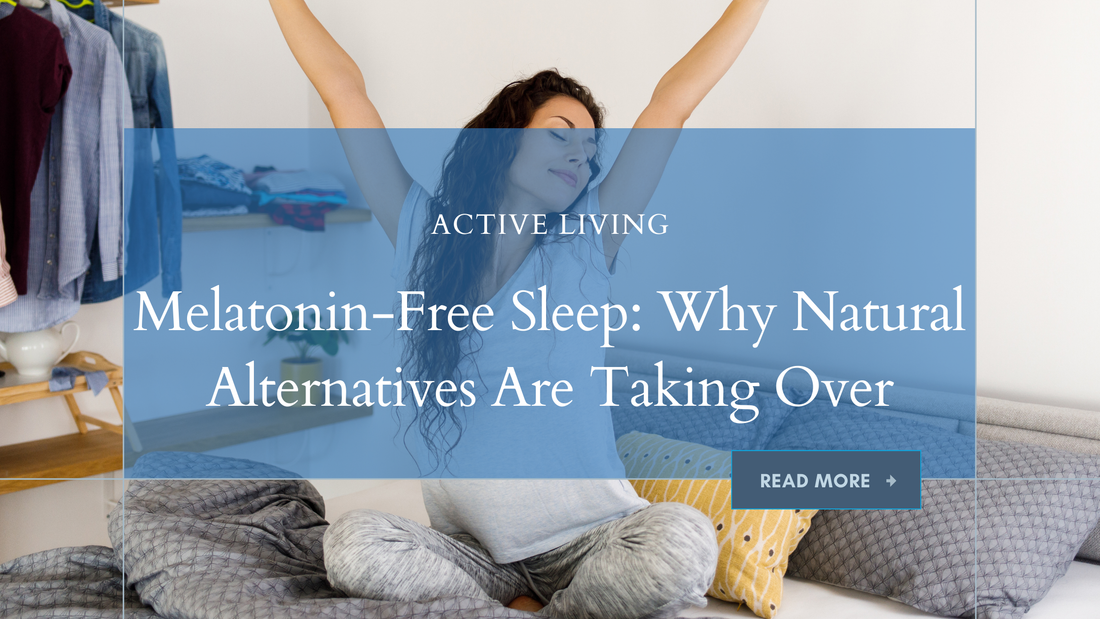Published: September 23, 2025 | Read Time: 8 minutes | Category: Sleep Health
It's 2:47 AM, and you're staring at the ceiling again. Your mind is racing through tomorrow's to-do list, replaying today's stresses, and wondering why sleep feels so out of reach.
Maybe you've tried melatonin. Maybe it worked for a while, but now you're dealing with morning grogginess, dependency concerns, or diminishing effectiveness.
The truth is, there's a growing movement away from synthetic sleep aids toward natural, melatonin-free solutions that work with your body instead of against it.
The Hidden Problems with Melatonin That No One Talks About
Melatonin gets marketed as the "natural" sleep solution, but here's what most people don't realize: the melatonin in supplements is synthetic, not natural. And while it might seem harmless, mounting research and user experiences reveal some concerning patterns.
The Morning After Effect
People start taking melatonin because they can’t sleep, but many end up feeling foggy and sluggish the next day.
Morning grogginess is one of the most commonly reported side effects of melatonin, particularly with higher doses or mistimed use. This 'melatonin hangover' can leave users feeling drowsy and foggy well into the next day, affecting their productivity and well-being.
The Dependency Dilemma
While melatonin doesn't appear to suppress natural production according to current research, some people do experience diminishing effectiveness over time, possibly due to individual differences in how the body metabolizes the supplement. Additionally, the long-term effects of regular melatonin use haven't been sufficiently studied, leading many to seek natural alternatives with longer safety profiles.
John Hopkins Medicine recommends not becoming dependent on melatonin for sleep and to take smaller doses.
The Dosing Disaster
Walk down any supplement aisle and you'll see melatonin doses ranging from 1mg to 10mg or more. But here's the kicker: most people only need 0.3-0.5mg for effectiveness.
Why Your Body Craves a Different Approach
Your sleep system is incredibly sophisticated. It's not just about one hormone (melatonin) - it's an intricate dance between neurotransmitters, stress hormones, and natural circadian rhythms.
The real culprits behind your sleepless nights are usually:
-
Elevated cortisol levels from chronic stress
-
Overactive nervous system that can't shift into "rest mode"
-
Racing thoughts and mental hyperactivity
-
Physical tension that prevents relaxation
This is why simply adding synthetic melatonin often feels like putting a band-aid on a broken pipe. You need to address the underlying systems that regulate sleep and stress.
The Science Behind Melatonin-Free Sleep Support
Natural sleep alternatives work by supporting your body's existing mechanisms rather than overriding them. Here's how the most effective botanicals and nutrients create better sleep:
Ashwagandha: The Stress-Sleep Connection
Multiple clinical studies show that ashwagandha can:
-
Reduce cortisol levels by up to 27%
-
Improve sleep quality scores by 72%
-
Decrease time to fall asleep by an average of 29%
How it works: Ashwagandha is an adaptogen, meaning it helps your body adapt to and manage stress. By regulating cortisol (your primary stress hormone), it removes one of the biggest barriers to quality sleep.
L-Theanine: The Calm Focus Factor
Found naturally in green tea, L-theanine promotes alpha brain waves - the same relaxed-but-alert state you experience during meditation.
Research shows L-theanine can:
-
Increase sleep efficiency (time spent actually sleeping vs. time in bed)
-
Reduce sleep disturbances
-
Improve morning alertness without causing daytime drowsiness
How it works: Unlike sedatives that force your brain into sleep mode, L-theanine creates the ideal mental state for natural sleep to occur.
GABA: Your Brain's Natural "Off Switch"
GABA (gamma-aminobutyric acid) is your nervous system's primary inhibitory neurotransmitter. Think of it as your brain's natural brake pedal.
Studies demonstrate that GABA supplementation can:
-
Reduce time to fall asleep by up to 20%
-
Increase deep sleep phases
-
Improve overall sleep satisfaction
How it works: GABA counteracts the excitatory neurotransmitters that keep your mind racing, naturally promoting the calm mental state necessary for sleep.
Valerian Root: 2,000 Years of Sleep Wisdom
Used since ancient Greek and Roman times, valerian root has the most extensive research history of any natural sleep aid.
Clinical trials show valerian can:
-
Improve sleep latency (time to fall asleep)
-
Enhance sleep quality without next-day sedation
-
Reduce nighttime awakenings
How it works: Valerian increases GABA availability in the brain while also having mild muscle-relaxing properties.
Passion Flower: The Anxiety Antidote
This beautiful flowering plant has been used traditionally for anxiety and sleep issues, with modern research backing up its effectiveness.
Studies reveal that passion flower:
-
Significantly reduces anxiety levels
-
Improves sleep quality comparable to low-dose prescription sleep aids
-
Enhances the calming effects of GABA
How it works: Passion flower contains compounds that bind to the same brain receptors as anti-anxiety medications, but without the side effects or dependency risks.
Your Natural Sleep Success Blueprint
Ready to transition from synthetic sleep aids to natural alternatives? Here's your step-by-step guide:
Phase 1: Foundation (Week 1-2)
Goal: Establish new sleep-supporting habits
Action Steps:
-
Begin with a comprehensive natural sleep blend containing the key botanicals mentioned above, like Sweet Serenity.
-
Take your natural sleep aid 30-60 minutes before desired bedtime.
-
Create a wind-down routine: dim lights, no screens, gentle activities like reading or stretching.
What to Expect: You may notice easier relaxation and less racing thoughts within the first few nights. Don't worry if sleep improvement takes a week or two. You're retraining your nervous system.
Phase 2: Optimization (Week 3-4)
Goal: Fine-tune your approach for maximum effectiveness
Action Steps:
-
Adjust timing and dosage based on your response.
-
Add stress-management practices during the day (meditation, deep breathing, gentle exercise).
-
Consider using a lower dose of your natural sleep blend for daytime stress management.
What to Expect: Sleep should become more consistent. You'll likely notice improved energy and mood during the day as your sleep quality improves.
Phase 3: Mastery (Month 2+)
Goal: Achieve sustainable, natural sleep patterns
Action Steps:
-
Continue with your optimized natural sleep alternative.
-
Focus on maintaining good sleep hygiene.
-
Use your natural sleep remedy as needed rather than nightly if possible.
What to Expect: Sleep becomes effortless again. You fall asleep naturally, sleep through the night, and wake up truly refreshed.
Real People, Real Results: Success Stories
Jennifer F. "I was skeptical about giving up melatonin, but the grogginess was affecting my teaching. Within two weeks of switching to a natural sleep remedy, Sweet Serenity. I was sleeping better AND waking up clear-headed!"
David R. "As someone who analyzes everything, I appreciated understanding HOW the natural ingredients work instead of just masking the problem with synthetic hormones. My sleep tracking app shows I'm getting 23% more deep sleep now."
Maria S. "The best part is I can take Sweet Serenity during stressful days, not just at bedtime. It helps me stay calm during the chaos without making me drowsy."
What to Look for in a Melatonin-Free Sleep Aid
Not all natural sleep supplements are created equal. Here's your checklist for finding an effective alternative:
Essential Ingredients to Include:
-
Ashwagandha - Look for 200-500mg
-
L-Theanine (Suntheanine® preferred) - 100-400mg effective dose
-
GABA - 500-750mg for sleep support
-
Valerian Root Extract - Standardized extract, 200-600mg
-
Passion Flower Extract - 100-400mg effective range
Quality Markers:
-
Third-party tested for purity and potency
-
GMP-certified manufacturing
-
No artificial colors, flavors, or unnecessary fillers
-
Clear labeling of extract ratios and active compounds
Company Credibility:
-
Transparent about sourcing and manufacturing
-
Provides educational content about ingredients
-
Offers satisfaction guarantees
-
Responsive customer service
Red Flags to Avoid:
-
Proprietary blends that hide ingredient amounts
-
Unrealistic claims or "instant" results promises
-
No quality testing information
-
Extremely low prices (often indicates poor quality ingredients)
Making the Switch: Your Transition Plan
If you're currently using melatonin and want to transition to natural alternatives, here's the safest approach:
Week 1: Gradual Reduction
-
Reduce melatonin dose by 50%.
-
Start the melatonin alternative at half the recommended dose.
-
Monitor sleep quality and adjust as needed.
Week 2: Complete Transition
-
Eliminate melatonin completely.
-
Continue with natural sleep alternative.
-
Focus on consistent bedtime routine.
Week 3+: Optimization
-
Fine-tune natural supplement timing and dosage.
-
Add daytime stress management practices.
-
Track improvements in sleep quality and daytime energy.
Important: If you've been using melatonin long-term or have underlying health conditions, consult with a healthcare provider before making changes to your sleep regimen.
Beyond Supplements: Creating Your Complete Sleep System
While natural sleep aids can be incredibly effective, they work best as part of a holistic approach to better sleep:
Sleep Environment Optimization
-
Keep your bedroom temperature between 65-68°F.
-
Use blackout curtains or an eye mask.
-
Consider a white noise machine or earplugs.
-
Invest in a comfortable, supportive mattress and pillows.
Daily Habits That Support Natural Sleep
-
Morning: Get 15-30 minutes of bright light exposure.
-
Afternoon: Avoid caffeine after 2 PM.
-
Evening: Begin wind-down routine 1-2 hours before bed.
-
Night: Keep your bedroom for sleep and intimacy only.
Stress Management Throughout the Day
-
Practice deep breathing exercises during stressful moments.
-
Take short walks, especially outdoors.
-
Set boundaries around work and technology.
-
Consider meditation, yoga, or other relaxation practices.
Your Next Step Toward Better Sleep
The path to natural, restorative sleep doesn't have to be complicated. You don't need to overhaul your entire life overnight or become a sleep optimization expert.
You just need to start with one change: choosing a natural sleep remedy that addresses the root causes of sleeplessness rather than masking them with synthetic hormones.
Ready to experience the difference? Sweet Serenity combines all five of these clinically-studied ingredients discussed in optimal doses, manufactured to the highest quality standards, and backed by a 60-day satisfaction guarantee.
Don't spend another night struggling with synthetic solutions that leave you groggy or dependent. Join thousands of people who have discovered that better sleep and better days are possible with the right approach.
Get to know Sweet Serenity and start your natural sleep transformation today →
*The statements in this article have not been evaluated by the Food and Drug Administration. Natural sleep aids are not intended to diagnose, treat, cure, or prevent any disease. Always consult with a healthcare professional before making changes to your sleep regimen.
Sources:
-
Chandrasekhar, K., et al. (2012). A prospective, randomized double-blind, placebo-controlled study of safety and efficacy of a high-concentration full-spectrum extract of ashwagandha root. Indian Journal of Medical Research.
-
Hidese, S., et al. (2019). Effects of L-theanine administration on stress-related symptoms and cognitive functions. Nutrients.
-
Byun, J.I., et al. (2018). Effects of GABA supplementation on sleep quality. Food & Function.
-
Bent, S., et al. (2006). Valerian for sleep: a systematic review and meta-analysis. American Journal of Medicine.
-
Ngan, A., & Conduit, R. (2011). A double-blind, placebo-controlled investigation of the effects of Passiflora incarnata (passionflower) herbal tea on subjective sleep quality. Phytotherapy Research.

